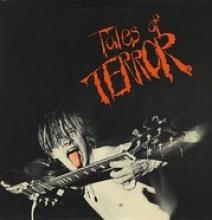There are probably more bands hailing from Sacramento than most folks would be able to name. Despite the city’s relative proximity to the Bay Area, group’s don’t very frequently make it to a great renown. Ganglians was the town’s last shot, but it doesn’t appear that the ensemble is going to turn in work as well wrought as “In June.” Bummer.
Either way, twenty some odd years prior to Ganglians releasing small run records through Woodsist, Tales of Terror showed up, presented a promising future and then subsequently fell apart. It’s pretty much the same story as any number of other punk bands hailing from the early and mid eighties with one difference. A lot of people figure the band as the impetus for the Seattle thing that would crop up a few years after the band’s dissolution.
That break up, though, wasn’t predicated on in fighting or some other nonsense. Instead, all it came down to was Lyon Wong inheriting the ire of some town’s folk, getting punched in the head and his head thusly smacking concrete. He died before making it to the hospital. Tales of Terror decided to pack it in with a few members going on to play with some other local groups.
What it left behind in the form of a single long playing record, though, is enough to solidify the band’s legacy. Issued in 1984 the self titled album has been used to make a case for ToT’s influence on the nascent Seattle scene. Green River was an avowed fan covering the Sacto band’s “Ozzy.” Kurt Cobain too included some of ToT’s work in various ‘best of’ lists found in his diaries. Of course, the U-Men were kicking around the Northwest before ToT issued work, but that seems to have been forgotten for convenience’s sake.
ToT’s wide range of influences are used as much to make that case. Surely, there’s some hardcore in the Sacto band’s sound as evidenced on “Deathryder,” which cops a slightly augmented Black Flag guitar sound. The hard rock run through Germs’ territory of “Chambers of Horror” lends credence to the band’s all inclusive approach as does the mutant rockabilly during “Over Elvis Worship.”
Like most instances of conjecture, there’s no way to sure any of this up. Certainly hearing some of ToT’s singer loosing his nut works in this equation. But there were countless groups working in this mode. ToT might not have changed anything about Seattle, but their recorded work remains impressive nonetheless.
